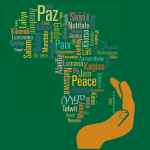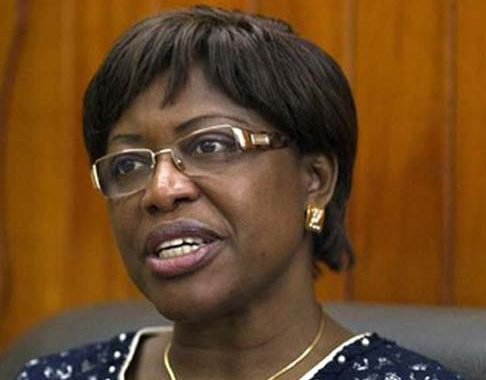Antoinette Montaigne, Former Minister of National Reconciliation in the Central African Republic
Justice, national reconciliation in the Central African Republic, living together, secularism. These are themes that today are questioning the French, but they also concern many countries. The Central African Republic is hardly emerging from a period of near-civil war and, at the very least, anarchy. France intervened with Operation Sangaris and the international community with the device of the Minusca.
Antoinette Montaigne, former Central African Minister for National Reconciliation, today head of the Peace Academy, answers the questions of the International Opinion on the situation in the Central African Republic. Interview.
What is the situation of the Central African Republic from the point of view of communities and of living together ?
The Central African Republic is recovering slowly but surely from its wounds linked to a particularly violent crisis. Today, civil communities are relearning to live together, it is important to say. The crisis had created confusion between communities and armed groups. The process of reconciliation that I launched in 2014 addressed this issue, it was the key to the exit from the crisis. By communicating with each other, the communities realized that it was a political crisis, but wanted to associate a confessional coloring to create a curtain of smoke. The real reason for the crisis is the unbridled rush to power. Central African communities are responsible and tolerant. We have a national language, sango, spoken on all the territory and in the neighboring countries, is rare in Africa. We thus have an invaluable wealth which favors the rapprochement between the members of the different communities.
The country has now returned to constitutional order and efforts are being made in this direction. We must thank the international community, in particular the United Nations Mission for the Central African Republic, which was set up after the African Union mission, MISCA, which has done remarkable but diverse work to alleviate the passions that produces a lot of violence.
The country is on track but much remains to be done to ensure that the trauma suffered can be reduced. We must continue to fight against poverty, one of the aspects of the crisis was the loss of the looted heritage, ransacked. This population is now destitute of everything. Some have not yet been able to return to their homes, which have been destroyed, burned or looted. The cattle were sold, consumed. These people should be given socio-economic reparations so that people who have nothing left to live can get back on a good footing.
It is said that the Central African crisis was and still is a religious conflict. Is that the case ?
We have not had religious conflicts but bad governance and economic predation. The State has not been managed in the interests of the people, nor in the development of the country. There was great difficulty in taking into account the vital needs of the population, starting with education. The population regresses in education compared to post-independence generations. Today, in a so-called French-speaking country where all are supposed to write and speak French, few are really capable. We see a decline in enrollment. People speak a popular French, it can be considered that the literacy rate is below 50%. We are more in oral transmission than in school learning.
The crisis prevented students from graduating the diplomas of the years 2012/2013, 2013/2014, 2014/2015. These "white" years complicate the education system. Thus, it is no longer a question of catching up with all these exams over a year as had been envisaged but of putting things back flat.
Does the composition of the new power coming out of the polls meet confessional criteria ?
I can not tell you because I did not take part in setting up this government. I can tell you that all the communities are represented and that the Central African Republic is a secular country. It is important not to give much space to the denominational question. It is not because some wishing to gain power have used the confessional pretext that the state must do the same. Central African society would lose. Dignity, unity, work, our national motto, carries no religious pretext. It is not showing dignity or unity to see human beings through their religions. That will not bring anything to the nation.
What does national reconciliation mean in CAR ?
This involves several things. First, to note the failure of the so-called inclusive political dialogues that have never included big world except the political elite. The gravity of the crisis shows the failure of a Central African political elite. Moreover, to note the political and social impunity which forms the breeding ground of the access to the power by the violence, the politico-social violence and the collapse of the State. Finally, to note that this process of political bankruptcy has led to widespread violence against the backdrop of the collapse of the state and all institutions. Reconciliation in the Central African Republic is the realization of all these dimensions in order to provide a lasting response.
Thus, from January to August 2014, as Minister of National Reconciliation I proposed popular consultations at the grassroots level. They made it possible to visit all the Central African territory, in the 79 sub-prefectures close to the populations, despite the occupation of the territory by the armed groups, in order to consult all the Central Africans. This action was carried out in 2015 after the Brazzaville forum and before the Bangui forum. On 28 March 2014, on the occasion of the anniversary of the death of the founder of the Republic, Boganda, an international conference and Lydie Nzengou, a journalist, organized a conference in Bangui for national reconciliation. note]. The strategy of reconciliation that I had proposed in 2014 had been doubly validated by the forces of the nation and by the Political Bureau of the Secretary General of the United Nations Mr. Ban Ki-Moon does not stop at the national forum of Bangui . It is a strategy of reconciliation shared by the population of the Central African Republic as a whole. It can not be abandoned. The launch of the Commission-Truth-Justice-Reparation-Reconciliation must take place quickly.
Truth, for what has happened can not be forgotten and must be said. Repair, because those who have lost everything need a boost to start living again. Once these criteria are met, people will be more willing to make lasting reconciliation.
What is the process of reconciliation ?
Reconciliation allowed the return of constitutional order and the election of a new president on March 30, 2016. We have a new Constitution. The institutions required for the functioning of the country, provided for in the Constitution, must be set up within a period of twelve months. We are afraid that the State will not succeed because it is a bloodless state with limited means. Without a deep desire for reconciliation, it will be difficult but it is the priority of the Head of State.
Are France and the international community as a whole occupying too much or too little space in the Central African Republic ?
The presence of France in a French-speaking country is not specific to the Central African Republic.
The international community comes in solidarity on behalf of the United Nations in troubled countries. It's like a doctor, it's up to you to tell him where you hurt. From my point of view, there is nothing particular to reproach the international community. Perhaps the Central Africans did not know how to grasp the hand that was being handed to them.
You go to Beirut soon, why ?
I was invited to the congress of the International Association of Francophone Mayors (AIMF), whose theme is "Building the Cities of Living Together", where I will present a paper. I know the AIMF well because they were concerned about the situation in 2014 in the Central African Republic.
In France, our motto is "freedom, equality, fraternity". You live in Bussy-Saint-Georges (77). What do you think of the climate in France ?
France needs fraternity which is the other name of living together, it is the act by which one does not reject the other but one extends the hand to him to discover and to share with him. The question of living together in France is not mishandled only by the attacks, it comes from very far. Remember the March of Beurs for equality, there was already a problem of fraternity, just like the riots of the suburbs in 2005. All these accumulated problems have created an evil being of French society and this since the 1990s. We did not pay enough attention to what happened.
I have worked on these issues for a long time, as a representative of the Ombudsman for 11 years. I was a professional in the protection of youth. I managed the 2005 riots in Seine-Saint-Denis, at the Minor Prosecutor's Office as head of the judicial and educational support center. It was a difficult time but the justice professionals were of high quality and we were able to extinguish the fire by calming it. However, we regret not having taken the measure of the riots of 2005. These events were heralds of what is happening today.
Minister, what are you doing today ?
I am a consultant on the issues of living together. With the crisis in my country, I became aware of the dangerous rise of all kinds of prejudice and intolerance. As Minister of Reconciliation, I realized that it takes little to make societies switch. I hope that Central Africa, an area disturbed by all types of conflicts, can be part of the process of living together.
I have launched a Peace Academy in the Central African Republic, but it is my ambition to go to other countries to talk about peace education. I am working in particular with the Network of the African Peace Education Initiative launched by the Pan-African Center for Social Prospects (CPPS) of the Institut Albert Tévoédjrè. We will organize classes of peace in the Central African Republic. We want pupils to be the nursery of peace tomorrow in the Central African Republic and in Africa.

